Strokes: Facts, symptoms and treatment
SINGAPORE — Former president SR Nathan suffered a stroke on July 31. Here, Dr Lee Kim En from Mount Elizabeth Medical Centre, offers more information about the symptoms and treatments for a stroke.
SINGAPORE — Former president SR Nathan suffered a stroke on July 31. Here, Dr Lee Kim En from Mount Elizabeth Medical Centre, offers more information about the symptoms and treatments for a stroke.
1) What is a stroke? Does a stroke patient usually show any symptoms before that? A stroke occurs when the blood supply to part of the brain is interrupted; this results in a deprivation of oxygen and nutrients to the brain. This is often sudden and abrupt. Hence only very few patients suffer warning symptoms.
2) How important is it to seek immediate treatment? Immediate treatment is crucial as stroke is a medical emergency. Severe disability and death are the feared consequences of delayed treatment such as delayed arrival at the hospital emergency, failure to detect the signs of stroke, not receiving the appropriate treatment, etc.
3) How do doctors typically treat stroke patients? Treatment depends on the type of stroke: Ischemic Stroke, Intracerebral Hemorrhage, Subarachnoid Hemorrhage. Ischemic stroke is caused by a blockage in the blood vessel that brings oxygen and nutrients to a part of the brain. Hemorrhagic stroke is caused by a burst in the blood vessel inside the brain (intracerebral hemorrhage) or in the space surrounding the brain (subarachnoid hemorrhage). For ischemic stroke, blood flow to the brain must be restored as quickly as possible using medications or emergency procedures. For intracerebral hemorrhage, control of bleeding and blood pressure is paramount; emergency surgery may be required to relieve high pressure in the brain. For subarachnoid hemorrhage, surgery or emergency procedures may be performed to repair blood vessel abnormalities if present.
4) What are the chances of a full recovery? Recovery depends on the area and amount of the brain affected by the stroke as well as the success of early treatment.
Dr Lee Kim En, Senior Consultant Neurologist at Mount Elizabeth Medical Centre, is also a Visiting Consultant at the National Neuroscience Institute and Adjunct Associate Professor at the National University of Singapore.







